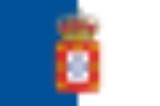
Kingdom of Portugal
Encyclopedia
The Kingdom of Portugal was Portugal
's general designation under the monarchy. The kingdom was located in the west of the Iberian Peninsula
, Europe
and existed from 1139 to 1910. It was replaced by the Portuguese First Republic
after the Lisbon Regicide
(1908) and ultimately, the 5 October 1910 revolution
.
on 26 July 1139 when Afonso I
was proclaimed king
of Portugal
.
In 1908, King Carlos I of Portugal was killed in a regicide
at Lisbon
. The Portuguese monarchy lasted until 5 October 1910, when through a revolution, it was overthrown and Portugal was proclaimed a republic
. The overthrow of the Portuguese monarchy in 1910 led to a 16 year struggle to sustain parliamentary democracy under republicanism.
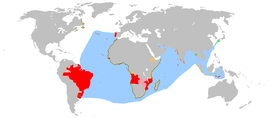
Through the times, the Kingdom of Portugal built what was known as the Portuguese Empire
since 1415, traditionally referring to its vast colonies, the largest of which was Brazil
(established in 1500 and an independent country since 1822). The remaining empire passed under control of the Portuguese Republic until the late 20th century, when the last overseas territories of Portugal were handed over (most notably Portuguese Africa, which included the overseas provinces of Angola and Mozambique, in 1975, and finally Macau
in 1999).
|- style="background:lavender;"
|align=center| 4 || Sancho II
||
|| 25 March 1223 || 3 January 1248 || || the Pious (o Capelo)
the Piteous (o Piedoso) || son of Afonso II
|- style="background:lavender;"
|align=center| 5 || Afonso III
||
|| 3 January 1248 || 16 February 1279 || Alphonso or Alphonse III (English),
Affonso III (Old Portuguese),
|| the Bolognian (o Bolonhês) || brother of Sancho II
younger son of Afonso II
|- style="background:lavender;"
|align=center| 6 || Dinis
||
|| 16 February 1279 || 7 January 1325 || Denis (English) or
Diniz (Old Portuguese) || the Farmer (o Lavrador)
the Poet-King (o Rei-Poeta)
the Troubadour-King (o Rei-Trovador) || son of Afonso III
|- style="background:lavender;"
|align=center| 7 || Afonso IV
||
|| 7 January 1325 || 28 May 1357 || Alphonso or Alphonse IV (English),
Affonso IV (Old Portuguese),
the Brave (o Bravo) || son of Dinis
|- style="background:lavender;"
|align=center| 8 || Pedro I
||
|| 28 May 1357 || 18 January 1367 || Peter I (English) || the Just (o Justiceiro)
or the Cruel (o Cruel)
the Vengeful (o Vingativo) or
the Until-the-End-of-the-World-In-Love
(o Até-ao-Fim-do-Mundo-Apaixonado) || son of Afonso IV
|- style="background:lavender;"
|align=center| 9 || Fernando I
||
|| 18 January 1367 || 22 October 1383 || Ferdinand I (English) || the Handsome (o Formoso)
the Beautiful (o Belo)
the Fickle (o Inconstante)
the Reckless (o Inconsciente) || son of Pedro I
|}
Portugal
Portugal , officially the Portuguese Republic is a country situated in southwestern Europe on the Iberian Peninsula. Portugal is the westernmost country of Europe, and is bordered by the Atlantic Ocean to the West and South and by Spain to the North and East. The Atlantic archipelagos of the...
's general designation under the monarchy. The kingdom was located in the west of the Iberian Peninsula
Iberian Peninsula
The Iberian Peninsula , sometimes called Iberia, is located in the extreme southwest of Europe and includes the modern-day sovereign states of Spain, Portugal and Andorra, as well as the British Overseas Territory of Gibraltar...
, Europe
Europe
Europe is, by convention, one of the world's seven continents. Comprising the westernmost peninsula of Eurasia, Europe is generally 'divided' from Asia to its east by the watershed divides of the Ural and Caucasus Mountains, the Ural River, the Caspian and Black Seas, and the waterways connecting...
and existed from 1139 to 1910. It was replaced by the Portuguese First Republic
Portuguese First Republic
The Portuguese First Republic spans a complex 16 year period in the history of Portugal, between the end of the period of constitutional monarchy marked by the 5 October 1910 revolution and the 28 May coup d'état of 1926...
after the Lisbon Regicide
Lisbon Regicide
The Lisbon Regicide was the name given for the assassinations of King Carlos I of Portugal and his heir, Luis Filipe, the Prince Royal by assassins sympathetic to republican interests...
(1908) and ultimately, the 5 October 1910 revolution
5 October 1910 revolution
The revolution of 1910 was a republican coup d'état that occurred in Portugal on 5 October 1910, which deposed King Manuel II and established the Portuguese First Republic....
.
Origins and end
The Second County of Portugal (1093–1139), successor to the First County of Portugal (868–1071), became a kingdomMonarchy
A monarchy is a form of government in which the office of head of state is usually held until death or abdication and is often hereditary and includes a royal house. In some cases, the monarch is elected...
on 26 July 1139 when Afonso I
Afonso I of Portugal
Afonso I or Dom Afonso Henriques , more commonly known as Afonso Henriques , nicknamed "the Conqueror" , "the Founder" or "the Great" by the Portuguese, and El-Bortukali and Ibn-Arrik by the Moors whom he fought, was the first King of Portugal...
was proclaimed king
King
- Centers of population :* King, Ontario, CanadaIn USA:* King, Indiana* King, North Carolina* King, Lincoln County, Wisconsin* King, Waupaca County, Wisconsin* King County, Washington- Moving-image works :Television:...
of Portugal
Portugal
Portugal , officially the Portuguese Republic is a country situated in southwestern Europe on the Iberian Peninsula. Portugal is the westernmost country of Europe, and is bordered by the Atlantic Ocean to the West and South and by Spain to the North and East. The Atlantic archipelagos of the...
.
In 1908, King Carlos I of Portugal was killed in a regicide
Regicide
The broad definition of regicide is the deliberate killing of a monarch, or the person responsible for the killing of a monarch. In a narrower sense, in the British tradition, it refers to the judicial execution of a king after a trial...
at Lisbon
Lisbon
Lisbon is the capital city and largest city of Portugal with a population of 545,245 within its administrative limits on a land area of . The urban area of Lisbon extends beyond the administrative city limits with a population of 3 million on an area of , making it the 9th most populous urban...
. The Portuguese monarchy lasted until 5 October 1910, when through a revolution, it was overthrown and Portugal was proclaimed a republic
Republic
A republic is a form of government in which the people, or some significant portion of them, have supreme control over the government and where offices of state are elected or chosen by elected people. In modern times, a common simplified definition of a republic is a government where the head of...
. The overthrow of the Portuguese monarchy in 1910 led to a 16 year struggle to sustain parliamentary democracy under republicanism.
The Portuguese Empire

Through the times, the Kingdom of Portugal built what was known as the Portuguese Empire
Portuguese Empire
The Portuguese Empire , also known as the Portuguese Overseas Empire or the Portuguese Colonial Empire , was the first global empire in history...
since 1415, traditionally referring to its vast colonies, the largest of which was Brazil
Colonial Brazil
In the history of Brazil, Colonial Brazil, officially the Viceroyalty of Brazil comprises the period from 1500, with the arrival of the Portuguese, until 1815, when Brazil was elevated to kingdom alongside Portugal as the United Kingdom of Portugal, Brazil and the Algarves.During the over 300 years...
(established in 1500 and an independent country since 1822). The remaining empire passed under control of the Portuguese Republic until the late 20th century, when the last overseas territories of Portugal were handed over (most notably Portuguese Africa, which included the overseas provinces of Angola and Mozambique, in 1975, and finally Macau
Macau
Macau , also spelled Macao , is, along with Hong Kong, one of the two special administrative regions of the People's Republic of China...
in 1999).
House of Burgundy
| # | Name | Started | Ended | Alternative names | Epithet(s) | Relationship with predecessor(s) | |
|---|---|---|---|---|---|---|---|
| 1 | Afonso I Afonso I of Portugal Afonso I or Dom Afonso Henriques , more commonly known as Afonso Henriques , nicknamed "the Conqueror" , "the Founder" or "the Great" by the Portuguese, and El-Bortukali and Ibn-Arrik by the Moors whom he fought, was the first King of Portugal... |
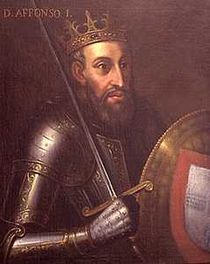 |
25 July 1139 | 6 December 1185 | Alphonso or Alphonse I (English), Afonso Henriques (Portuguese alternative), Affonso I (Old Portuguese Galician-Portuguese Galician-Portuguese or Old Portuguese was a West Iberian Romance language spoken in the Middle Ages, in the northwest area of the Iberian Peninsula. It was first spoken in the area bounded in the north and west by the Atlantic Ocean and the Douro River in the south but it was later extended south... ), |
the Conqueror (o Conquistador) The Founder (o Fundador) the Great (o Grande) |
son of Henry, Count of Portugal Henry, Count of Portugal Henry of Burgundy, Count of Portugal was Count of Portugal from 1093 to his death. He was brother of Hugh I, Duke of Burgundy, and Odo I, Duke of Burgundy, all sons of Henry, the heir of Robert I, Duke of Burgundy. His name is Henri in modern French, Henricus in Latin, Enrique in modern Spanish... |
| 2 | Sancho I Sancho I of Portugal Sancho I , nicknamed the Populator , second monarch of Portugal, was born on 11 November 1154 in Coimbra and died on 26 March 1212 in the same city. He was the second but only surviving legitimate son and fourth child of Afonso I of Portugal by his wife, Maud of Savoy. Sancho succeeded his father... |
 |
6 December 1185 | 27 March 1211 | the Populator (o Povoador) | son of Afonso I | |
| 3 | Afonso II Afonso II of Portugal Afonso II , or Affonso , Alfonso or Alphonso or Alphonsus , nicknamed "the Fat" , third king of Portugal, was born in Coimbra on 23 April 1185 and died on 25 March 1223 in the same city. He was the second but eldest surviving son of Sancho I of Portugal by his wife, Dulce, Infanta of Aragon... |
 |
27 March 1211 | 25 March 1223 | Alphonso or Alphonse II (English), Affonso II (Galician-Portuguese), |
the Fat (o Gordo) | son of Sancho I |
|- style="background:lavender;"
|align=center| 4 || Sancho II
Sancho II of Portugal
Sancho II , nicknamed "the Pious" and "the Caped" or "the Capuched" , , fourth King of Portugal, was the eldest son of Afonso II of Portugal by his wife, Infanta Urraca of Castile...
||

|| 25 March 1223 || 3 January 1248 || || the Pious (o Capelo)
the Piteous (o Piedoso) || son of Afonso II
|- style="background:lavender;"
|align=center| 5 || Afonso III
Afonso III of Portugal
Afonso III , or Affonso , Alfonso or Alphonso or Alphonsus , the Bolognian , the fifth King of Portugal and the first to use the title King of Portugal and the Algarve, from 1249...
||
|| 3 January 1248 || 16 February 1279 || Alphonso or Alphonse III (English),
Affonso III (Old Portuguese),
|| the Bolognian (o Bolonhês) || brother of Sancho II
younger son of Afonso II
|- style="background:lavender;"
|align=center| 6 || Dinis
Denis of Portugal
Dinis , called the Farmer King , was the sixth King of Portugal and the Algarve. The eldest son of Afonso III of Portugal by his second wife, Beatrice of Castile and grandson of king Alfonso X of Castile , Dinis succeeded his father in 1279.-Biography:As heir to the throne, Infante Dinis was...
||

|| 16 February 1279 || 7 January 1325 || Denis (English) or
Diniz (Old Portuguese) || the Farmer (o Lavrador)
the Poet-King (o Rei-Poeta)
the Troubadour-King (o Rei-Trovador) || son of Afonso III
|- style="background:lavender;"
|align=center| 7 || Afonso IV
Afonso IV of Portugal
Afonso IV , called the Brave , was the seventh king of Portugal and the Algarve from 1325 until his death. He was the only legitimate son of King Denis of Portugal by his wife Elizabeth of Aragon.-Biography:...
||

|| 7 January 1325 || 28 May 1357 || Alphonso or Alphonse IV (English),
Affonso IV (Old Portuguese),
the Brave (o Bravo) || son of Dinis
|- style="background:lavender;"
|align=center| 8 || Pedro I
Peter I of Portugal
Peter I , called the Just , was the eighth King of Portugal and the Algarve from 1357 until his death. He was the third but only surviving son of Afonso IV of Portugal and his wife, princess Beatrice of Castile....
||

|| 28 May 1357 || 18 January 1367 || Peter I (English) || the Just (o Justiceiro)
or the Cruel (o Cruel)
the Vengeful (o Vingativo) or
the Until-the-End-of-the-World-In-Love
(o Até-ao-Fim-do-Mundo-Apaixonado) || son of Afonso IV
|- style="background:lavender;"
|align=center| 9 || Fernando I
Ferdinand I of Portugal
Ferdinand I , sometimes referred to as the Handsome or rarely as the Inconstant , was the ninth King of Portugal and the Algarve, the second son of Peter I and his wife, Constance of Castile...
||

|| 18 January 1367 || 22 October 1383 || Ferdinand I (English) || the Handsome (o Formoso)
the Beautiful (o Belo)
the Fickle (o Inconstante)
the Reckless (o Inconsciente) || son of Pedro I
|}
House of Aviz
| # | Name | Started | Ended | Alternative names | Epithet(s) | Relationship with predecessor | | Notes | |
|---|---|---|---|---|---|---|---|---|
| 10 | João I John I of Portugal John I KG , called the Good or of Happy Memory, more rarely and outside Portugal the Bastard, was the tenth King of Portugal and the Algarve and the first to use the title Lord of Ceuta... |
 |
6 April 1385 | 14 August 1433 | John I (English) | the Master of Avis (o Mestre de Avis), the One of Good Memory (o de Boa Memória), the Good (o Bom) or the Great (o Grande) |
Half-brother of Fernando I Illegitimate son of Pedro I |
|
| 11 | Duarte |  |
14 August 1433 | 9 September 1438 | Edward (English) | the Eloquent (o Eloquente) or the Philosopher-King (o Rei-Filósofo) |
son of João I | |
| 12 | Afonso V Afonso V of Portugal Afonso V KG , called the African , was the twelfth King of Portugal and the Algarves. His sobriquet refers to his conquests in Northern Africa.-Early life:... |
 |
9 September 1438 | 11 November 1477 | Alphonzo V (English), Alphonse V (English), Affonso V (Old Portuguese) |
the African (o Africano) | son of Duarte | Abdicated in favor of his son, who has assumed the duties of a regent of the kingdom. |
| 13 | João II John II of Portugal John II , the Perfect Prince , was the thirteenth king of Portugal and the Algarves... |
 |
11 November 1477 | 15 November 1477 | John II (English) | the Perfect Prince (o Príncipe Perfeito) or the Tyrant (o Tirano) |
son of Afonso V | Acclaimed King by the Cortes of Santarém, only to abdicate and return the throne to his father. |
| 12 | Afonso V Afonso V of Portugal Afonso V KG , called the African , was the twelfth King of Portugal and the Algarves. His sobriquet refers to his conquests in Northern Africa.-Early life:... |
 |
15 November 1477 | 28 August 1481 | Alphonzo V (English), Alphonse V (English), Affonso V (Old Portuguese) |
the African (o Africano) | son of Duarte | Resumed reign until death. |
| 13 | João II John II of Portugal John II , the Perfect Prince , was the thirteenth king of Portugal and the Algarves... |
 |
28 August 1481 | 25 October 1495 | John II (English) | the Perfect Prince (o Príncipe Perfeito) or the Tyrant (o Tirano) |
son of Afonso V |
House of Aviz-Beja
| 14 | Manuel I Manuel I of Portugal Manuel I , the Fortunate , 14th king of Portugal and the Algarves was the son of Infante Ferdinand, Duke of Viseu, , by his wife, Infanta Beatrice of Portugal... |
 |
25 October 1495 | 13 December 1521 | Emmanuel I (English), Manoel I (Old Portuguese) |
the Fortunate (o Venturoso, o Bem-Aventurado or o Afortunado) |
first cousin and brother-in-law of João II grandson of Duarte |
| 15 | João III John III of Portugal John III , nicknamed o Piedoso , was the fifteenth King of Portugal and the Algarves. He was the son of King Manuel I and Maria of Aragon, the third daughter of King Ferdinand II of Aragon and Queen Isabella I of Castile... |
 |
13 December 1521 | 11 June 1557 | John III (English) | the Pious (o Piedoso or o Pio) |
son of Manuel I |
| 16 | Sebastião Sebastian of Portugal Sebastian "the Desired" was the 16th king of Portugal and the Algarves. He was the son of Prince John of Portugal and his wife, Joan of Spain... |
 |
11 June 1557 | 4 August 1578 | Sebastian (English) | the Desired (o Desejado) | grandson of João III |
| 17 | Henrique |  |
27 August 1578 | 31 January 1580 | Henry (English) | the Chaste (o Casto) or the Cardinal-King (o Cardeal-Rei) |
granduncle of Sebastian younger son of Manuel I |
| (18?) | António (disputed) |
 |
24 July 1580 | 25 August 1580 (in continental Portugal) 27 July 1583 (in the Azores) |
Anthony (English) | the Prior of Crato (o Prior do Crato) the Determined (o Determinado) the Fighter (o Lutador) the Independentist (o Independentista) |
nephew of João III and Henrique grandson of Manuel I |
House of Habsburg
| # | Name | Started | Ended | Alternative names | Epithet(s) | Relationship with predecessor(s) | |
|---|---|---|---|---|---|---|---|
| 18 | Filipe I Philip II of Spain Philip II was King of Spain, Portugal, Naples, Sicily, and, while married to Mary I, King of England and Ireland. He was lord of the Seventeen Provinces from 1556 until 1581, holding various titles for the individual territories such as duke or count.... |
25 March 1581 | 13 September 1598 | Philip I (English) Felipe II (in Spain) |
the Prudent (o Prudente) | grandson of Manuel I |
|
| 19 | Filipe II Philip III of Spain Philip III , also known as Philip the Pious, was the King of Spain and King of Portugal and the Algarves, where he ruled as Philip II , from 1598 until his death... |
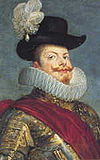 |
13 September 1598 | 31 March 1621 | Philip II (English) Felipe III (in Spain) |
the Cruel (o Cruel) (in Portugal) the Pious (el Pio) (in Spain) |
son of Filipe I |
| 20 | Filipe III Philip IV of Spain Philip IV was King of Spain between 1621 and 1665, sovereign of the Spanish Netherlands, and King of Portugal until 1640... |
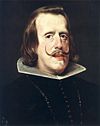 |
31 March 1621 | 15 December 1640 | Philip III (English) Felipe IV (in Spain) |
the Oppressor (o Opressor) (in Portugal) the Great (el Grande) (in Spain) |
son of Filipe II |
House of Braganza
| # | Name | Started | Ended | Alternative names | Epithet(s) | Relationship with predecessor(s) | |
|---|---|---|---|---|---|---|---|
| 21 | João IV John IV of Portugal |-|John IV was the King of Portugal and the Algarves from 1640 to his death. He was the grandson of Catherine, Duchess of Braganza, who had in 1580 claimed the Portuguese crown and sparked the struggle for the throne of Portugal. John was nicknamed John the Restorer... |
 |
15 December 1640 | 6 November 1656 | John IV (English) | the Restoring King (o Restaurador) the Fortunate (o Afortunado) |
great-great-grandson of Manuel I |
| 22 | Afonso VI |  |
6 November 1656 | 12 September 1683 | Afonso VI (Portuguese), Alphonse VI (English), Affonso VI (Old Portuguese) |
the Victorious (o Vitorioso) | son of João IV |
| 23 | Pedro II |  |
12 September 1683 | 9 December 1706 | Peter II (English) | the Pacific (o Pacífico) | brother of Afonso VI younger son of João IV |
| 24 | João V |  |
9 December 1706 | 31 July 1750 | John V (English) | the Magnanimous (o Magnânimo) the Magnific (o Magnífico) the Portuguese Sun-King (o Rei-Sol Português) |
son of Pedro II |
| 25 | José I |  |
31 July 1750 | 24 February 1777 | Joseph I (English) | the Reformer (o Reformador) | son of John V |
| 26 | Maria I |  |
24 February 1777 | 20 March 1816 | Mary I (English) | the Pious (a Piedosa or a Pia) the Mad (a Louca) (in Brazil) |
daughter of José I |
| Pedro III Peter III of Portugal Peter III became King of the Kingdom of Portugal and the Algarves by the accession of his wife and niece Queen Maria I in 1777, and co-reigned alongside her until his death.-Biography:... |
24 February 1777 | 25 May 1786 | Peter III (English) | son of João V husband of Maria I |
|||
| 27 | João VI John VI of Portugal John VI John VI John VI (full name: João Maria José Francisco Xavier de Paula Luís António Domingos Rafael; (13 May 1767 – 10 March 1826) was King of the United Kingdom of Portugal, Brazil and the Algarves (later changed to just King of Portugal and the Algarves, after Brazil was recognized... |
 |
20 March 1816 | 10 March 1826 | John VI (English) | the Clement (o Clemente) | son of Pedro III and Maria I |
| 28 | Pedro IV | 10 March 1826 | 2 May 1826 | Peter IV (English) or Pedro I (in Brazil) |
the Soldier-King (o Rei-Soldado) the Emperor-King (o Rei-Imperador) the Liberator (o Libertador) |
son of João VI | |
| 29 | Maria II |  |
2 May 1826 | 30 June 1828 | Mary II (English) | the Educator (a Educadora) the Good-Mother (a Boa-Mãe) |
daughter of Pedro IV |
| 30 | Miguel Miguel of Portugal Dom Miguel I, sometimes Michael , was the King of Portugal between 1828 and 1834, the seventh child and second son of King John VI and his queen, Charlotte of Spain.... |
 |
30 June 1828 | 26 May 1834 | Michael (English) | the Traditionalist (o Tradicionalista), the Usurper (o Usurpador) or the Absolutist (o Absolutista) the Absolut-King (o Rei Absoluto) |
brother of Pedro IV younger son of João VI |
| - | Maria II |  |
26 May 1834 | 15 November 1853 | Mary II (English) | the Educator (a Educadora) | daughter of Pedro IV |
| Fernando II Ferdinand II of Portugal Ferdinand of Saxe-Coburg and Gotha , named Prince Ferdinand Augustus Francis Anthony of Saxe-Coburg-Gotha-Koháry, was King of Portugal as husband of Queen Maria II of Portugal from the birth of their son in 1837 to her death in 1853.In keeping with Portuguese law, only after the birth of his son in... |
16 September 1837 | 15 November 1853 | Ferdinand II (English) | husband of Maria II |
House of Braganza-Saxe-Coburg and Gotha
| # | Name | Started | Ended | Alternative names | Epithet(s) | Relationship with predecessor(s) | |
|---|---|---|---|---|---|---|---|
| 31 | Pedro V |  |
15 November 1853 | 11 November 1861 | Peter V (English) | the Hopeful (o Esperançoso) the Loved One (o Bem-Amado) the Much Loved (o Muito Amado) |
son of Fernando II and Maria II |
| 32 | Luís I |  |
11 November 1861 | 19 October 1889 | Louis (English), Luiz (Old Portuguese) |
the Popular (o Popular) the Good (o Bom) |
brother of Pedro V son of Fernando II and Maria II |
| 33 | Carlos I |  |
19 October 1889 | 1 February 1908 | Charles (English) | the Martyred (o Martirizado) or the Diplomat (o Diplomata) the Martyr (o Mártir) the Oceanographer (o Oceanógrafo) |
son of Luís I |
| 34 | Manuel II Manuel II of Portugal Manuel II , named Manuel Maria Filipe Carlos Amélio Luís Miguel Rafael Gabriel Gonzaga Francisco de Assis Eugénio de Bragança Orleães Sabóia e Saxe-Coburgo-Gotha — , was the last King of Portugal from 1908 to 1910, ascending the throne after the assassination of his father and elder brother Manuel... |
1 February 1908 | 5 October 1910 | Emmanuel II (English), Manoel II (Old Portuguese) |
the Patriot (o Patriota) the Unfortunate (o Desventurado) the Scholar (o Estudioso) or the Missed King (o Rei-Saudade Saudade Saudade ) is a unique Galician-Portuguese word that has no immediate translation in English. Saudade describes a deep emotional state of nostalgic longing for an absent something or someone that one loves. It often carries a repressed knowledge that the object of longing might never return... ) |
son of Carlos I |
See also
- United Kingdom of Portugal, Brazil and the Algarves

